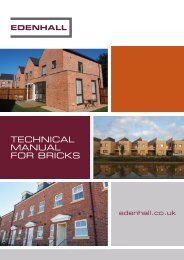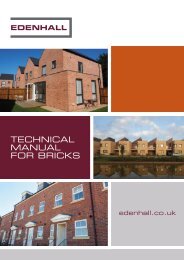You also want an ePaper? Increase the reach of your titles
YUMPU automatically turns print PDFs into web optimized ePapers that Google loves.
BRICK TECHNICAL BULLETIN<br />
DURABILITY<br />
BTB 6<br />
There are no known instances of failure of correctly manufactured concrete bricks used in masonry walls due to frost action.<br />
<strong>Edenhall</strong>, in conjunction with the Building Research Establishment Scottish Laboratory, commissioned accelerated freeze/thaw<br />
testing of a variety of concrete bricks in the 1990s, which recorded no frost damage and concluded that the bricks have durability<br />
at least equivalent to the old clay brick ‘F’ classification.<br />
More recently <strong>Edenhall</strong> has commissioned further product testing with accredited laboratories to confirm the durability classification.<br />
<strong>Edenhall</strong> has adopted the BSI document for testing clay masonry units because there is no test method specified in BS EN 772.<br />
This enables <strong>Edenhall</strong> to meet the requirements needed to state the exposure classification of its bricks.<br />
Sample bricks are tested for determination of freeze/thaw resistance in accordance with the British Standard <strong>Technical</strong> Specification<br />
method of testing clay masonry units DD CEN/TS 772-22: 2006. This involves subjecting a panel of brickwork to repeated freeze/<br />
thaw cycles designed to simulate naturally occurring weather conditions. From the test results the manufacturer gives the bricks<br />
a declared freeze/thaw resistance classification by reference to its applicability or intended usage and whether it is subjected to<br />
passive, moderate or severe conditions.<br />
The brick classifications are: F2: Severe Exposure<br />
F1: Moderate Exposure<br />
FO: Passive Exposure<br />
The panel of brickwork tested is subjected to 100 cycles, each cycle consisting of a flood coat of water, a drain period, a freezing<br />
period, and a thawing period, with a cycle time of circa four hours. After each cycle the panel is visually examined for damage with<br />
every tenth cycle including a physical “soundness” test and a final examination of each brick after the 100 cycles are complete.<br />
THE FREEZE/THAW CYCLE DIAGRAM<br />
<strong>Edenhall</strong> facing bricks can be classified as F2 and are suitable for<br />
use in building situations where they are subjected to repeated<br />
freezing and thawing.<br />
THAWING<br />
20 minutes<br />
Heaters at 20˚C<br />
(± 3˚C)<br />
Note: An F2 classification brick will provide excellent resistance<br />
to frost attack but in particularly wet or exposed locations even<br />
F2 products may exhibit some signs of damage, eg. steps,<br />
retaining type walls and exposure to de-icing salts.<br />
FREEZING<br />
120 minutes<br />
Air temperature<br />
-15˚C<br />
(± 3˚C)<br />
WATER SPRAY<br />
2 minutes<br />
DRAINING<br />
2 minutes<br />
Head Office: PD <strong>Edenhall</strong> Ltd, Danygraig Road, Risca, Newport, NP11 6DP Tel: 01633 612671 Fax: 01633 601280 edenhall.co.uk<br />
The information and guidance contained in our <strong>Technical</strong> Bulletins, <strong>Technical</strong> Data Sheets and <strong>Technical</strong> Manual are regularly reviewed as part of <strong>Edenhall</strong>’s continuous development and<br />
improvement programme. Updates and amendments can be made without notice and the Company cannot accept liability for any errors or omissions. The content of this document<br />
and the referenced data sheets and bulletins, including tables, diagrams and images, are subject to copyright.







